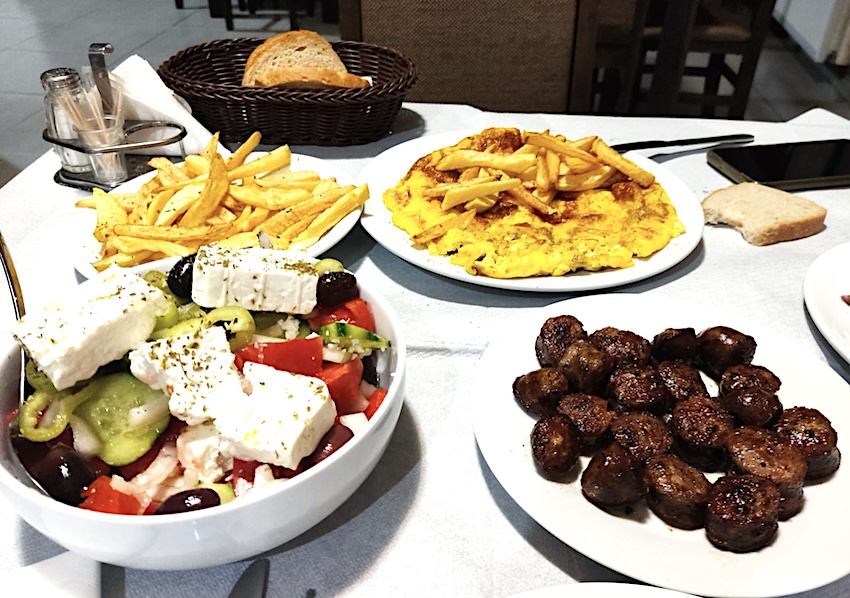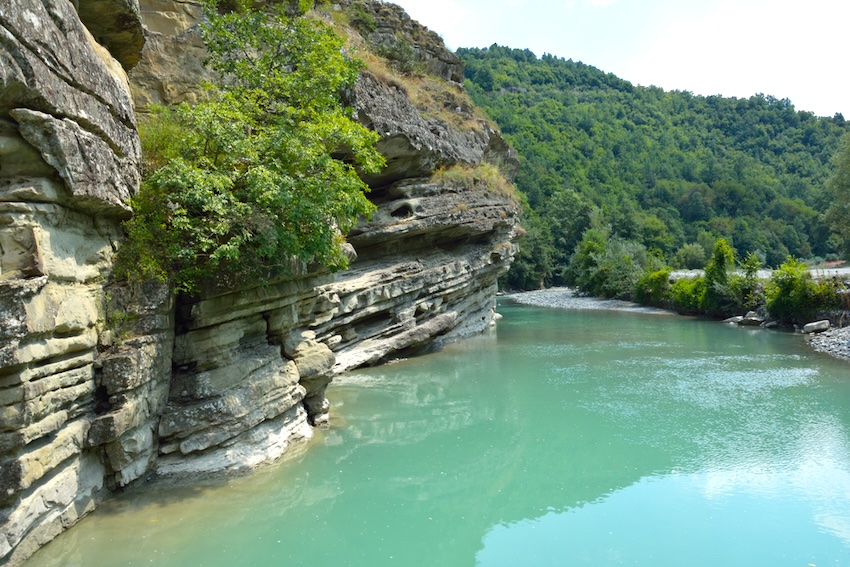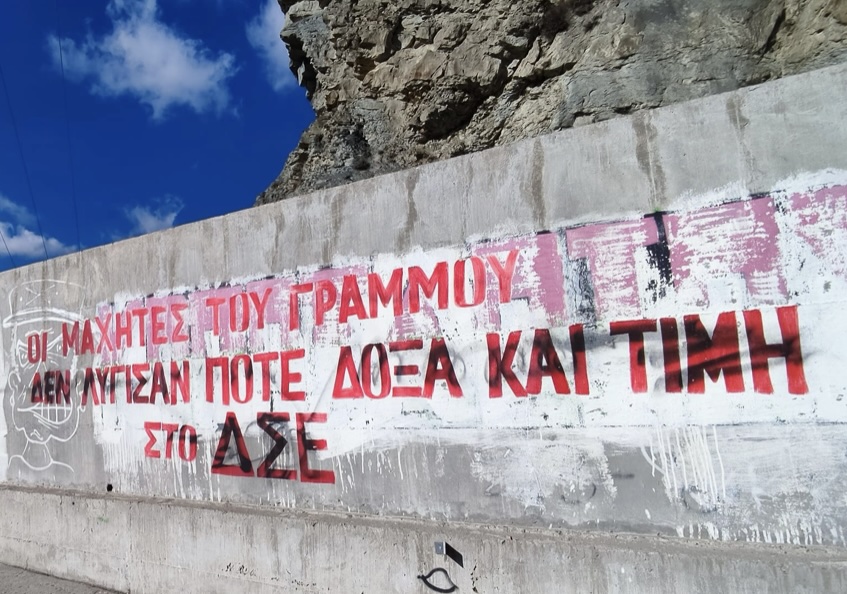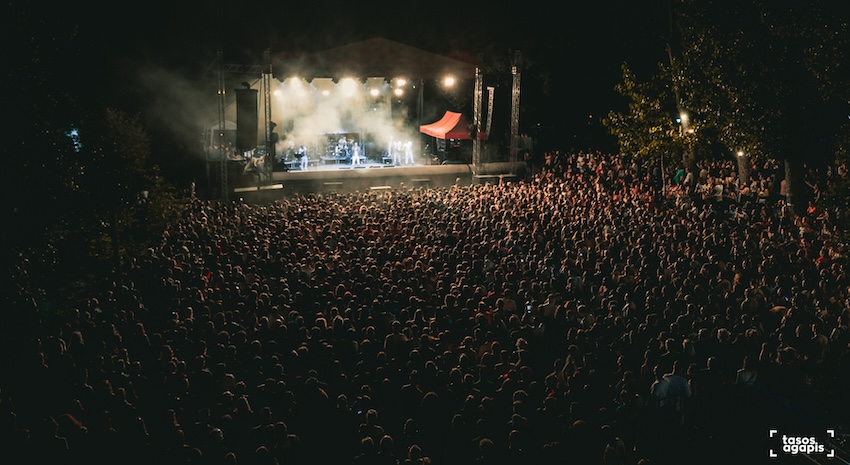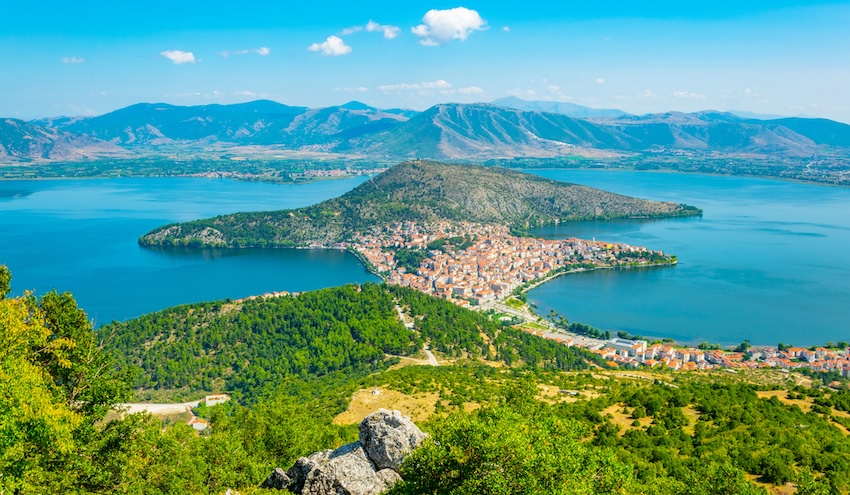
Nestorio
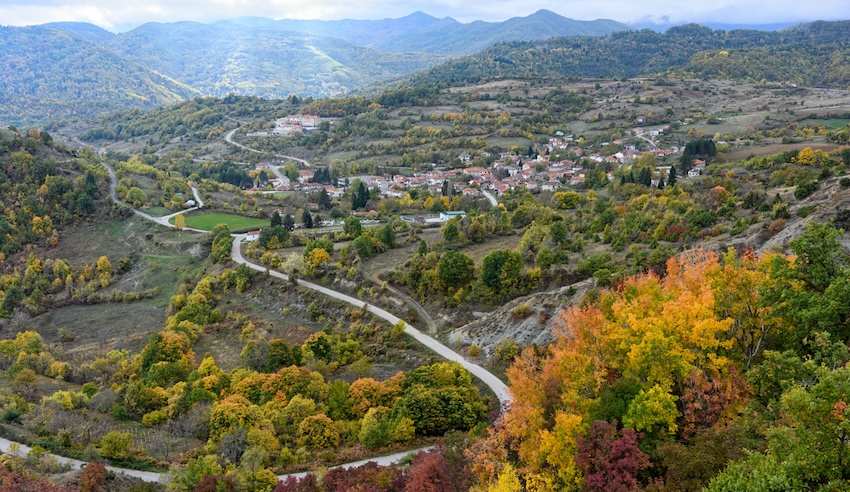
|
By Maria Verivaki Just before dusk, after a very long drive through the empty and more remote parts of West Epirus, we crossed into West Macedonian territory. However beautiful the autumn scenery felt to us, the landscape looked very bleak because it was void of human life. The area is connected by well-maintained roads, but not people live there. It comes to life in summer when home owners return with their families to see the hot months through. After leaving Papingo, we had been driving the whole day weaving in and out of the villages we passed by, just to get the feel of the place. Some villages had half a dozen residents at the most. We counted the smoking chimneys: sometimes, there were none. If you google the area, you will find many restaurants and cafes listed in the area, but they don’t operate in the off season (they don’t update their hours). The most you’ll find open is a mini-market along the way, and there weren’t that many of them either. We had a good breakfast that morning and then stopped at the quaint but highly picturesque town of Konitsa for coffee and some people watching. But once past Konitsa, the landscape became a food desert. I had made a last-minute booking for a room in Nestorio – surely if a hotel is working in the area, it would have a place to grab a bite to eat. |
|
We had arrived in lower Nestorio (there was also an upper Nestorio), where we noticed what looked like a café on the main road. There was a menu board on the road, the lights were on, and from the window we even saw a few people sitting both inside and outside despite the cold. We felt like we had hit the jackpot. The men were in the older category and nearly all of them were holding a gklitsa (wooden walking stick), but there were also some women sitting around a table in the café who looked much younger. But no one was eating. As we entered the shop, a tiny woman immediately jumped off her chair where she was sitting with the women: Παρακαλω? she said, noting our presence. I wasn’t sure how to answer her. Ψηνετε τιποτα? (Are you cooking anything?) It was a strange thing to ask. It made us sound like we were starving. I don't know if we were even hungry. One just assumes that one will have a nice sit down meal wherever they are while holidaying in Greece, just like they show us in the tourist brochures, and maybe this is what made us think we should be looking for a place to eat before we got to the hotel which was just a minute away from the cafe. And then, something strange happened: all the other women in the cafe got up to leave without even looking at us, leaving the first lady who spoke to us alone. The men followed suit; some sat outdoors, while the others went home, as I assumed since there didn’t seem to be much more happening in the area. We found this disturbing because it would never happen where we came from (Crete): we would all remain in the cafe, eavesdropping on the conversation - where are they from? what jobs do they do? what are they doing here? Της ωρας, she replied. Short order cooking? I'm imagining a grill with μπριτζολες (pork chops), μπατζετα (pancetta strips), μπιφτεκι (meat patties), συκωτι (beef liver), λουκανικα (sausages), just like what was mentioned on the sandwich board. But indoors, I couldn't even see where the kitchen was located. So I began ordering: Μπορειτε να μας τηγανiσετε πατατες? Can you fry us some potatoes? Fried potatoes is the easiest dish to prepare on the spot. All you need is potatoes, oil and salt (optional). Αμε, δικες μας! Of course, they’re our own! So they were growing their own potatoes. Μήπως έχετε κατι κρεατικo? Do you have any meat dishes? I was hoping for something like sausages which are freezer staple. Οτι θελετε, μπριτζολα, πανσετα, μπιφτεκι, λουκανικα, οτι θελετε! Pork steak, pancetta, meat patties, sausages, whatever you prefer! Their freezer was obviously full, making it easy to prepare a meal on short order. We decided on sausages. Να σας βαλω και αυγa; Δικα μας παλι! Shall I add some eggs. They’re also ours! It turned out that she kept chickens too. Σαλατα εχετε? I asked if salad was available. While we were driving around, we rarely saw a home garden growing outside a house, but there were hardly any people living there which is no surprise. Αμε, μαρουλι, λαχανο, νοτματα, αγγουρι, οτι θελετε, δικα μας ειναι ολα! Sure, lettuce, cabbage, tomato, cucumber, whatever you want, they’re all ours! She kept a full home garden, obviously to supplement the shop. This all sounded too good to be true. Here we are, night has fallen, it's dark, it’s quiet, no one is walking outside, not even a dog, and we’re sitting in a (now) empty shop which was serving a full menu. She then left us and turned on the lights of a room which was obviously the kitchen space, leaving us alone to take in the setting. From the window, we could see a river in the distance, weaving across the hills. I was making assumptions: The people that had left were obviously friends and locals. She was probably wondering what time she would close her shop, when we walked in. The others left to allow her to do her job. From afar, the town looked huge, but it was clearly underpopulated. The woman popped in and out every now and then to excuse her absence because she had left us alone. |
|
|
|
She asked us where we were from. Χανια?! Τι κανετε εδω?! Chania! What are you doing here? We often got that kind of reaction wherever we went, making us realise how people in remote sparsely populated areas view us. Crete must have a hell of a reputation in the north. When the meal was ready, she brought it over to us. She wanted to leave us in peace, but we didn't let her. We were here to discover the north, and we felt rather privileged to have it to ourselves. People like the lady at the cafe were helping us to understand it more, and she also wanted to know about us. We asked each other many questions. She spoke almost perfect Greek; her accent gave away her origins. She was originally from Bulgaria., and she had taught herself the language. She had met her husband while working in a clothing factory in Bulgaria which was owned by a Greek from Nestorio. He had gone there to visit his business friend, the two of them met, she came to Nestorio where they married and had a family. She had been in Greece for almost two decades. They opened to allow them to make a living. Like its neighbour Epirus, West Macedonia's high season is mainly when home owners and visitors from abroad (often with links to the area) come in summer. Nestorio also has many guesthouses which are in use throughout the year, with coach tours arriving on weekends, long weekends, and during major holidays. "It's very quiet here," she told us, "too quiet really, there are just 350 or so people living here, it's difficult to envisage any serious kind of development, with crisis after crisis hitting us harder than other places, so many people have left to go and work abroad, and many locals took their businesses to Bulgaria for cheaper labour, winter can be very harsh, but it's better in summer when we're busy with travelers every day, and there's the River Party - you know about the River Party?" We didn't, but River Party would come up again the next day in our conversations with other Nestorians. It's the first time I've ever seen a placename written in English on those blue signs indicating the distance in kilometres from a specific point. |
|
|
|
We spoke about the difficulty of finding work in the area. The picturesque town of Kastoria lies just 25 kilometres away, but since the decline of the fur trade there (first covid, then the war between Russia and Ukraine), jobs were lost, money became tight, and the whole area is now experiencing an unemployment crisis of proportions it had never seen, even in the Greek economic crisis. Her husband had landed a job in the public sector and this kept them going. When his parents died and their son was old enough to be more independent, they decided to open the village cafe. "You can’t make enough to pay the bills by selling just a few coffees to the handful of παππουδες (old men) in the village," she said, "so we installed a kitchen a few years ago and we can now provide simple meals. We grow potatoes and salad vegetables and I keep a few chickens for their eggs. But everything else comes from Kastoria which is half an hour away, it's the only town close to us. Nestorio is too small to be self-reliant. It's very busy during the River Party period, but that's just for a few days. It's quite a struggle to make the cafe work all year round, but we plod on and hope for the best." She goes home to Bulgaria just before Christmas to spend a month with family. I imagined how lonely the town would be without her, without the lights of the cafe burning. We now had a better picture of what was going on. We could have conversed all night with this wonderful talker, asking her questions, letting her tell us about her life here, but we had to get to the hotel before the reception closed. We said goodbye which, for the first time in our lives, felt very hard. |
|
When we got to the hotel, we were amazed to see so many people in the lobby. It felt like the old men had moved from the cafe to the hotel, and continued their conversation there. We were in two minds to accept the offer of breakfast (5 euro per person) the next day, as we wondered whether it would be nice to go back to the cafe and continue the conversation. We decided to take the hotel breakfast. We got ourselves settled into our room (warm, cosy, spacious, very clean – just 29 euro for the two of us). It had been a long day. We found another Greek couple in the breakfast room the next day (we did in fact see travelers at all the hotels we stasyed during our holidays). They were in a similar position to ourselves: they work in summer tourism and take their holidays in the off season. We talked about the long hot summer, the drought that the whole country was facing, and our olive trees with their dried-up fruit. We were all visiting the area due to our interests in civil war history. Yes! Greece went through a civil war at the end of the 1940. It's no longer a taboo subject: the previous weekend before we arrived, which coincided with the OXI commemorations, the leader of KKE (Greek communist party) had been in the region, opening a museum dedicated to this historical period. |
|
|
|
An older man sat in the far corner of the room. It looked like his favorite seat. He was the owner of the rooms which his son ran. The other couple were asking him about the places they could visit in the area. They were looking at a map. We listened intently so that we didn't have to ask him the same questions. Is Gramos accessible? Yes it is, but you won't see much there now. It's very remote. What's this village, Ag. Zacharias? Oh, that's just ruins. Look, the map says Ερ., that means ερείπια, just the ruins are left. Is the road good for visiting the DSE outdoor hospital? (DSE: the communists’ Democratic Army of Greece). It depends, he said, as long as the streams haven't destroyed the road. This man had lived in Nestorio through the civil war as a young boy. Born in 1941, he still remembers the time when the residents of the mountain villages were moved out of their homes, when the final battles were to take place. The villagers lived nomadically in these places and were used to moving with their flocks, to lower grounds in the winter, and back home on higher ground in the summer. But being told to leave their homes (which were later razed, so that they could not go back) shocked them. Some went to Albania, where they could take their flocks and set up tents for shelter. They were even given pastureland by Albania, and allowed to live nomadically like they were used to. Many also came to Nestorio where they were told by state officials that they would return home as soon as the battles were over. At the time, Nestorio numbered more than 3,500 residents. The refugees were put up in people's homes, with whoever had space. It was to be a temporary measure. But when the weeks turned into months, they looked to find a way out. They could no longer stay in a stranger's house but they could not return home either. The stranger didn't want them any more, there wasn't enough space, there wasn't enough food, it was difficult to keep oneself clean. When they realised that returning home was not an option for the foreseeable future, they began to leave. Many went abroad to the new countries, others crossed the border to the communist countries, while a good many went to another part of the country, mainly urban centres like Athens, Thessaloniki, Ioannina and Thessaly, and the city of Larissa, where those who lived nomadically used to take their flocks in the winter. |
|
“We weren't treated well here by the state”, the man told us. “They couldn't trust us... They regarded us as Slavs... But we weren't even Vlachs... My parents and grandparents had lived in Nestorio all their lives... So they didn't help our village, they just left us to our own devices... And the village began to empty... And now, we're just a handful of people, 500 residents at the most, where once we were thousands!” He sounded hopeful when he spoke to us about the newest development in the village: a Greek American businessman opened a water bottling plant in a former cooperative headquarters, under the name Arena. We had been served Arena water in other places we visited. Nestorio is less than an hour from the Albanian border. “Many people had to cross into Albania during the civil war, but we don't have problems with the Albanians now, we are all good with each other. There were some problems when the Albanians began crossing the border after the fall of communism in 1990. They poured through the village, stealing whatever they could... they were hungry, they needed a place to rest, … “ He stopped talking at this point, as he remembered those difficult times. In his younger days, he had worked in the fur trade when it was at its peak, driving to Kastoria every day: “Fur was so highly regarded in the past, that people used to prize it above property. A granddaughter would ask her grandmother to inherit a fur coat, and let another family member inherit an apartment,” he told us while chuckling. |
Nestorio River Party |
|
|
|
The significance of Nestorio is hardly known by most Greeks. But for such a tiny town, it has actually made an immense impact in modern Greek history in a way no one can imagine: it's now famous for its River Party. The man told us about the time when the descendants of Greek Americans came to their hometown, how they loved hanging out on hot summer nights right by the Aliakmonas river. They played music, they sang, they laughed and they camped on the river banks. Eventually, the river party became an international event, which has been taking place for more than 40 years without a break, and the site (the same one is used) has been named River Party, always written in English. He also pronounced it like he remembered the Americans did back in the day: rivaparry! See the Nestorio River Party website |
|
|
|
We arrived in Kastoria in the mid afternoon, feeling grateful to find some places open for eats and drinks. We had a souvlaki. The owner was a retired horticulturalist who had spent some time working in Crete. He lamented the fact that it hadn't snowed yet in Kastoria, as it once did in the past at this time. We heard the same from a friend we met up with there, who showed us the town by night. Kastoria felt like a small busy town, like most Greek towns we had traveled through on our travels. But it has suffered a lot in recent times with the collapse of the fur trade – it suffers from high unemployment. If you ever find yourself in the more remote parts of Greece in the off-season, always ask if breakfast is offered (it will save you the hassle of finding out that there isn't much open in the area), and keep your car filled with fuel. Not everything is very well signposted so you won’t be able to work out distances. The GPS will show you the road, but it won't tell you what condition it is in. And if you do happen to come on a weekend or in the summer, or when it's River Party season in Nestorio, make sure you book a place, because you won't find anything available last minute – everything is working at 100% capacity then. Nestorio is a great place for nature lovers to base themselves, with many walking trails. It’s best to hire a car, because the area is not well served by public transport. |
Accommodations in Nestorio |
|
Boasting a garden and views of mountain, Seirios Guest House is a recently renovated guest house set in Nestorio. Among the facilities of this property are a restaurant, a lift and luggage storage space, along with free WiFi throughout the property. The Afkos Grammos Boutique Hotel Resort features accommodation with a seasonal outdoor swimming pool, free private parking, a fitness centre and a garden. Guesthouse Ahillion has mountain views, free WiFi and free private parking. To Spiti Τou Gakou provides accommodation in Nestorio with access to a gardenas well as mountain and river views. If nothing is available you can also Search Hotels in Kastoria |
Help Support Matt's Greece Guides
Do you enjoy using my site? Have you found it entertaining as well as useful? If so please show your appreciation by booking hotels through the travel agencies and the links found on my Hotels of Greece site. The small commission I make on the bookings enable me to keep working and in most cases you won't find them any cheaper by searching elsewhere.
You can find
hotels in Greece by location, price, whether or not it has a swimming pool, and see photos and reviews by using this link to booking.com which also contributes to my website when you book. If you are appreciative of all the free information you get on my websites you can also send
a donation through Paypal or Venmo
Join Matt Barrett's Greece Travel Guides Group on Facebook for comments, photos and other fun stuff. If you enjoy this website please share it with your friends on Facebook and other social media.
